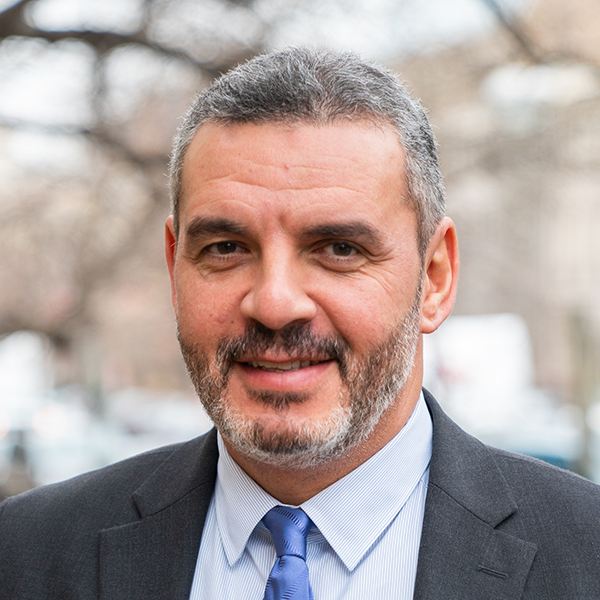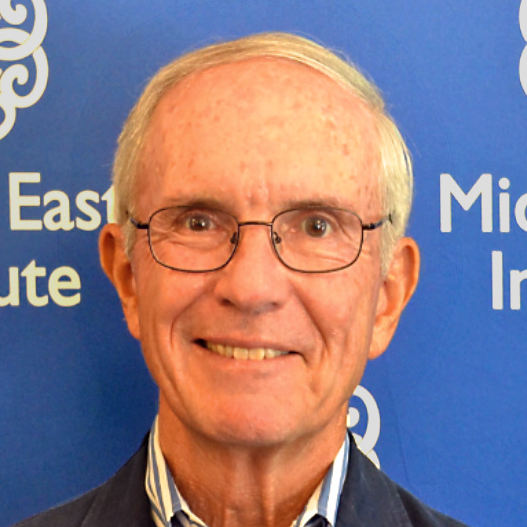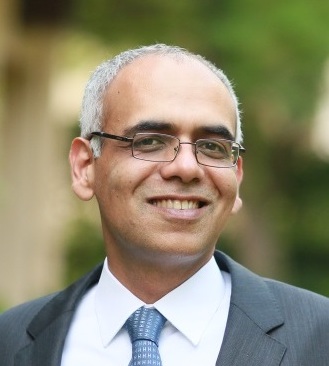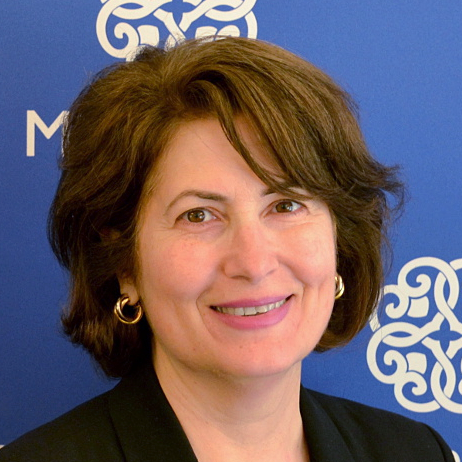Contents:
- Annual "Flag March" has become a symbol of growing extremism in Israeli politics
- Arab League summit reflects ongoing Saudi efforts toward regional de-escalation, normalization
- Pakistan’s unprecedented, unpredictable political flux
- Iraq’s internal situation improving, but volatile political and security challenges remain
Annual “Flag March” has become a symbol of growing extremism in Israeli politics
Khaled Elgindy
Senior Fellow, Director of Program on Palestine and Palestinian-Israeli Affairs

-
In recent years, in parallel with the general rightward shift in Israeli politics and society, the “Flag March” has become a more blatant display of Israeli triumphalism, Jewish supremacy, anti-Arab bigotry, as well as anti-Palestinian violence.
-
One key distinction over previous years was the presence of senior government officials, including extremists National Security Minister Ben-Gvir and Finance Minister Smotrich as well as Transportation Minister Regev from Netanyahu’s Likud Party.
Last Thursday’s “Flag March” went off largely as anticipated, with tens of thousands of far-right Israeli activists converging on Jerusalem’s Old City in a raucous display of nationalist fervor. The march was provocatively routed through the Damascus Gate in the heart of Palestinian East Jerusalem.
The annual rally, which commemorates Israel’s conquest of East Jerusalem in 1967, including the Old City, with its many Jewish, Christian, and Muslim holy sites, has long been viewed by Palestinians as an intentional affirmation of Israeli dominance and a provocation. In recent years however, in parallel with the general rightward shift in Israeli politics and society, the Flag March has become a more blatant display of Israeli triumphalism, Jewish supremacy, anti-Arab bigotry, as well as anti-Palestinian violence.
This year’s event included the standard repertoire of racist and incendiary chants — “Death to Arabs,” “Muhammad is dead,” and “The Jew is a soul, the Arab is a son of a whore,” being among the most favored. A few hundred Jewish marchers, accompanied by a heavy Israeli security contingent, also made their way to the al-Aqsa Mosque compound (known to Jews as the Temple Mount). In preparation for the march, Israeli security forces conducted what they called a “sterilization” of Palestinians from the Old City, forcing Palestinian businesses to close, removing as many Palestinians from the area as possible, and restricting their movement. The actions were ostensibly to minimize points of friction; but for Palestinian Jerusalemites, they served as another reminder of their subordinate status.
One key distinction in this year’s march over previous years, however, was the presence of senior government ministers, including National Security Minister Itamar Ben-Gvir of the Jewish Power Party, a Kahanist party that calls for the removal of Palestinians from the country, fellow supremacist, Finance Minister Bezalel Smotrich of the Religious Zionism Party, and Transportation Minister Miri Regev of Prime Minister Benjamin Netanyahu’s Likud Party.
The U.S. State Department “unequivocally” condemned the racist chants as “outrageous and unacceptable” and called on the Israeli government to likewise condemn them. But given the presence of Netanyahu’s coalition partners and even members of his own Likud Party at the Jerusalem rally last week, such condemnations are unlikely to come. Although this year’s Flag March passed with only minimal violence, it nonetheless serves as a reminder of the growing extremism in Israeli politics, which now extends to the highest levels of the government as well.
Follow on Twitter: @elgindy_
Arab League summit reflects ongoing Saudi efforts toward regional de-escalation, normalization
Thomas W. Lippman
Non-Resident Scholar

-
Last week’s Arab League summit in Jeddah, attended by Syria’s Bashar al-Assad, represented Saudi Arabia’s ongoing efforts at improved or at least stabilized relations with its neighbors, including Iraq, Turkey, Qatar, and Iran.
-
But the Saudis still have demands the Syrian strongman is not prepared to meet, and Riyadh is unlikely to invest in Syria as long as U.S. sanctions remain in place.
Syrian President Bashar al-Assad’s participation in the Arab League summit, in Jeddah, on Friday, represented the latest surprising link in the chain of improved or at least stabilized relations that Saudi Arabia has forged with its neighbors over the past few years.
Under the leadership of Crown Prince Mohammed bin Salman (MbS), the kingdom has backed off from confrontations and rivalries that proved futile or counterproductive. Instead, Riyadh has sought to emphasize regional cooperation and economic development. Putting those conflicts in the past enables Saudi Arabia — a stable, prosperous, self-confident, and well-armed nation in a region of troubled neighbors and failed states — to pursue its quest for leadership in the Arab world.
An early step in this new direction came in April 2019, when Saudi Arabia reopened its embassy in Iraq after nearly 30 years. Their century-old cross-border rivalry had intensified after the United States invaded Iraq in 2003. The Saudis refused to do business with the post-invasion government of Nouri al-Maliki, whom they regarded as an ineffective leader and a pawn of Iran who enabled Iraq’s Shi’a Muslims to dominate the country, to the benefit of Tehran.
Two years later, MbS abandoned a pointless boycott of neighboring Qatar that Saudi Arabia and other countries had imposed because of Doha’s policy of independence and its refusal to terminate economic relations with the Islamic Republic, its partner in a massive natural gas field in the Persian Gulf. Qatar never capitulated to any of Saudi Arabia’s absurd demands, such as closing the news outlet Al-Jazeera, and MbS came to recognize that the boycott was more trouble than it was worth.
Then, the Saudi crown prince reconciled with Turkish President Recep Tayyip Erdoğan, welcoming him for a visit in April 2022. Erdoğan had sent troops to defend Qatar if Saudi Arabia invaded, and some of his political allies had criticized Saudi management of the annual pilgrimage to Mecca.
In the midst of those developments, Saudi Arabia developed a strong working relationship with Russia in managing global oil output and finessed American outrage over the murder of Jamal Khashoggi to maintain its security partnership with the U.S.
In March, a Chinese diplomatic initiative helped reestablish relations between Saudi Arabia and Iran. And though the Yemen civil war remains unresolved, the Saudis are participating in a cease-fire and negotiations with the rebel Houthis, who had long been armed by the Iranian government.
Reinstating Syria’s membership in the Arab League and welcoming Assad to the summit — after Saudi Arabia spent several years and billions of dollars trying to bring him down — is acceptance of reality, regional analysts said. He survived, with the help of Russia and Iran, and is not going away.
But the Saudis still have demands that the Syrian strongman is not prepared to meet, such as stopping the cross-border flow of Captagon, a stimulant that is illegal in the kingdom. And as long as the Assad regime remains the subject of strict U.S. sanctions, it is doubtful that Saudi Arabia will soon resume trade and investment in Syria.
Pakistan’s unprecedented, unpredictable political flux
Syed Mohammad Ali
Non-Resident Scholar

-
Former Pakistani Prime Minster Imran Khan’s political opponents and the military establishment seem reluctant to allow him to contest this autumn’s general elections, which could see him return to power with a robust majority.
-
Pakistan has had its share of domestic turbulence in the past, but the current impasse is unique in terms of the levels of inter-institutional fighting and political polarization it has evoked, with the outcome particularly difficult to predict.
Pakistan is in the throes of a power struggle that shows no sign of resolution, despite the strain this tussle has placed on the faltering economy and on the principal institutions of the state. The former prime minister, Imran Khan, has been pressuring the coalition government, comprised of his political opponents, and the military establishment to immediately hold general elections, which could see him return to power with a robust majority.
Despite a history of clear links to the establishment — namely, his reliance on military backing and support from the political elite to rule Pakistan from mid-2018 to early 2022 — Khan has increasingly fashioned himself as a revolutionary hero who aims to “drain the swamp” of Pakistani politics, allegedly mired by corruption, nepotism, and Western hegemony. While Khan was overthrown constitutionally, having lost a vote of confidence in parliament, he blamed the United States and Pakistan’s Army for having orchestrated his downfall.
The shaky coalition government that replaced Khan in April 2022 has struggled to cope with the climate change-induced monsoon super-floods this past year, which caused $40 billion in damages to an economy already on the brink of collapse. Pakistan has also seen a spike in terrorism — the direct consequence of increasingly belligerent militants being easily able to seek refuge across the border in Taliban-controlled Afghanistan.
General elections were scheduled to take place this October, but Khan’s political opponents and the military seem reluctant to allow Khan to contest them. Like many politicians before him, Khan has been laden with charges of corruption, and there was even a failed attempt on his life this past November. Khan was then arrested earlier this month while in court for a hearing concerning one of the graft cases against him. This arrest catalyzed his already charged base to wreak havoc across major cities, which included attacks on major government and military buildings, including the general headquarters of the Army in Rawalpindi and the home of the core commander in Lahore.
While the judiciary stepped in to release Khan on bail, the ruling government is now trying its best to re-arrest him. Much of the senior leadership of Khan’s party, the Pakistan Tehreek-e-Insaf (PTI), has been detained. The military showed restraint during these past weeks of agitation, but it now wants to try rioters in military courts. No other major political party is backing Khan’s bid to push back against the all-powerful Armed Forces. Instead, the PTI has itself seen some attrition following the recent political violence, which Khan accuses his opponents of having staged to discredit his movement.
Neither the Army chief, Gen. Syed Asim Munir, nor Khan and his supporters seem ready for compromise. Pakistan has had its share of domestic turbulence in the past, but the current impasse is unique in terms of the levels of inter-institutional fighting and political polarization it has evoked. The present situation is too uncertain and fluid to predict what this upheaval means for Pakistan’s political future.
Iraq’s internal situation improving, but volatile political and security challenges remain
Randa Slim
Senior Fellow and Director of Conflict Resolution and Track II Dialogues Program

-
Iraq has made noticeable economic and security gains, but they are fragile and easily affected by domestic, regional, and international developments.
-
Corruption, environmental degradation, the future of Shi’a cleric Muqtada al-Sadr, and the potential space created by the recent Saudi-Iranian détente are all top of mind issues for Iraqis.
Economic and security conditions in Iraq are in a better place than they have ever been since 2003, yet the gains achieved to date remain fragile and easily affected by domestic, regional, and international developments. In her May 18 briefing to the United Nations Security Council, Jeanine Hennis-Plasschaert, the special representative of the secretary-general and head of the U.N. Assistance Mission for Iraq (UNAMI), noted, “Now is not the time to be complacent, or to take for granted that Iraq has turned a corner.” At best, one can say Iraq remains very much a work in progress and still has a long way to go.
Hennis-Plasschaert’s remarks, indeed, reflect observations this author made during a recent trip to Baghdad:
First, the impression a non-frequent visitor to the Iraqi capital gets is that there is a fair degree of security, a building spree is ongoing in different districts, cafes and restaurants teem with customers late into the night, and an air of normalcy hangs over the city.
However, corruption is top of mind in every conversation with Iraqis. Despite the pledges made by Prime Minister Mohammed Shia al-Sudani’s government to fight endemic corruption, Iraqis have yet to see any tangible evidence of this, let alone a significant impact on their lives. Moreover, they do not believe Sudani’s anti-corruption efforts will amount to much mainly because the Iraqi prime minister himself is neither willing nor able to make the tough decisions that are necessary, including ones that would undermine the hold his allies in the governing State Administration Coalition maintain over key state resources.
Third, more than during any of this author’s previous visits to Iraq, the topic of environmental degradation and climate change came up frequently in conversations with state officials. Water scarcity is a major challenge due to multiple factors, including a prolonged drought, inadequate water management policies, neglect and damage to infrastructure, and construction of upstream dams in Turkey and Iran. While the level of urgency to deal with the water crisis has risen among government officials, a serious and well-integrated inter-agency roadmap for dealing with this crisis is still lacking.
Fourth, another topic that often came up in conversations was the future of Shi’a cleric Muqtada al-Sadr and his political movement. There was a fair amount of confusion about what is driving Sadr’s decision-making process, whom he is listening to, and what may be his next moves. Some members in the State Administration Coalition, especially former Prime Minister Nouri al-Maliki and Asaeb Ahl al-Haq leader Qais al-Khaza’li, now argue that this might be a perfect time for the ruling coalition to diminish Sadr’s political clout to the point of driving him out of the political process altogether. Helping them in this campaign is Sadr himself. His erratic behavior and surprise announcements have begun to undermine some of the huge political capital that his late uncle and father had accumulated for the Sadr family among Iraqi Shi’a. Muqtada al-Sadr’s recent declaration that he was suspending the movement he had led for a year, except for religious activities such as Friday prayers, citing corruption among some of his followers, was only the latest such unpredictable move. It is clear, however, that this statement was at least partly in reaction to a recent fatwa issued by Grand Ayatollah Mohammad Ishaq al-Fayyadh, which Sadr interpreted as aiming to undermine his family’s religious authority among its followers.
Finally, unlike during this author’s previous visits to Iraq, when tensions between Iran and the United States as well as between Iran and Saudi Arabia topped every discussion with Iraqi officials and experts alike, this time conversations were more focused on the Saudi-Iranian détente and the political space it has opened for Iraq. Amid the present regional de-escalatory trends, Iraqis believe, their country may play a leading role in creating synergies and driving cooperation in the Iranian-Arab political and economic space. The impression one gets these days is that there is an institutional push at all policymaking levels for Iraq to make this convenor and regional mediator role an integral component of its foreign policy. Along these lines, Prime Minister Sudani announced at the recent Arab League Summit in Jeddah, Saudi Arabia, that the 2023 Baghdad Conference — the third convening of this regional cooperation and partnership forum — would specifically focus on strengthening economic ties within the region.
Follow on Twitter: @rmslim
Photo by Matan Golan/SOPA Images/LightRocket via Getty Images
The Middle East Institute (MEI) is an independent, non-partisan, non-for-profit, educational organization. It does not engage in advocacy and its scholars’ opinions are their own. MEI welcomes financial donations, but retains sole editorial control over its work and its publications reflect only the authors’ views. For a listing of MEI donors, please click here.